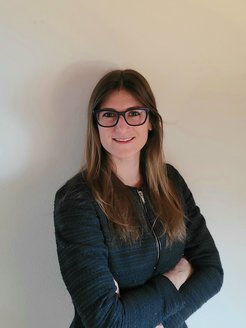Elena Redaelli receives Otto Hahn Medal
For her excellent Dissertation, MPE junior scientist Elena Redaelli will receive the Otto Hahn Medal from the Max Planck Society in 2021. The prize is awarded for work on regions of our Galaxy where stars like our Sun are currently formed, being able to unveil the physical and chemical structure of interstellar molecular clouds. Her thesis on various aspects of star formation includes three peer-reviewed papers and future work with enough material for more papers as well as ideas for future observations and analysis.

Elena Redaelli receives the Otto Hahn Medal 2021 from the Max Planck Society.
Star formation has become a major topic in modern astrophysics, with astrochemistry playing an increasingly important role in answering the question of where, how and when stars form. In her dissertation, which has been graded as “excellent”, Elena Redaelli investigated various aspects of the very early stages of low-mass star formation.
In dense interstellar clouds, which are the precursors of stellar systems like our own, Redaelli investigated certain molecules (so-called fractionated molecules, containing Deuterium and 15-Nitrogen). This allowed her to link the composition of primitive material in our Solar System with that of new star formation sites in our Galaxy, thus helping in elucidating our astrochemical history. Her results triggered an international effort by theoretical groups to understand the chemical and physical processes behind the values measured by her, which cannot be reproduced by current astrochemical models.
In her studies, she also observed molecular ions in a protostellar system using IRAM (Institute of Millimetric Radioastronomy) telescopes, and soon realised that these data could help to gain understanding on the role of magnetic fields in star forming regions. Using the infrared telescope SOFIA to measure the magnetic field direction in a dense cloud, Redaelli indeed found correlations between gas flows and the direction of the magnetic field, thus unveiling the crucial role of magnetic fields in regulating the motion of material in star forming regions.
Currently, Redaelli, now in a Minerva Fast Track position, is continuing her investigations with several follow-up observations using various telescopes, which already have been partially observed. She has already published an additional paper, and another one is in preparation.












